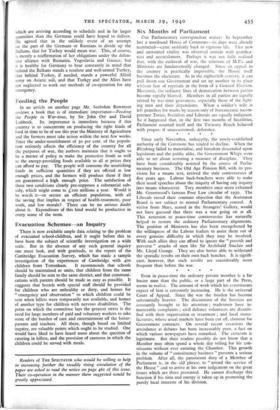Since early November, unhappily, the newly-established authority of the Commons
has tended to decline. When the Blitzkrieg failed to materialise, and boredom descended upon legislators and the public alike, the Government Whips were able to set about restoring a measure of discipline. They have been considerably assisted by the course of Parlia- mentary business. The Old Age Pension Bill, with its pro- vision for a means test, revived the stale controversies of five years ago. Labour back-benchers were able to make their usual speeches about the iniquity of having any inquiry into means whatsoever. Tory members once more exhumed Mr. Greenwood's famous Poor Law circular of 1930. The Liberals raised their constant objection that the Assistance Board is not subject to normal Parliamentary control. A visitor from Mars, seated in the Strangers' Gallery, would not have guessed that there was a war going on at all. This reversion to peace-time controversies has naturally helped to restore the ordinary Parliamentary alignments. The position of Ministers has also been strengthened by the willingness of the Labour leaders to assist them out of every genuine difficulty in which they may be involved. With such allies they can afford to ignore the " peevish and perverse " attacks of men like Sir Archibald Sinclair and Mr. Lloyd George. They are also better able to withstand the sporadic revolts on their own back benches. It is signifi- cant, however, that such revolts are considerably more frequent than before the war.
* * * *


































 Previous page
Previous page